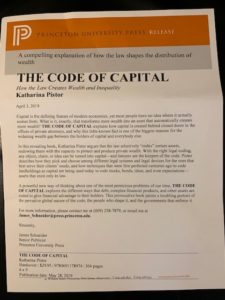I haven’t yet read law-professor Katharina Pistor’s new book, The Code of Capital: How Law Creates Wealth and Inequality. Princeton University Press sent me a complimentary copy.
 The book’s subtitle combines with the flyer that came along with the book to make me not want to read this volume.
The book’s subtitle combines with the flyer that came along with the book to make me not want to read this volume.
First – and least importantly – books that pander to current obsessions immediately raise my suspicions about such books’ quality. People today – and especially those on the political left – are obsessed with inequalities in monetary wealth and income. Yet my experience when reading these modern descriptions and complaints about such inequality is that the complainers are often very careless with the statistics they report, and surprisingly shallow in their attempted explanations of why such inequalities matter.
I continue to be at a loss to understand why I should care that Jeff Bezos’s monetary income and wealth are magnitudes larger than my own or that of most other Americans. Did Mr. Bezos steal all or some of his wealth? If so, the problem is with his manner of acquiring his fortune and not with the size of his fortune relative to that of anyone else or group of anyone elses. But if, as I’m pretty sure is true, Mr. Bezos created his wealth, what’s the problem? I see no problem.
Second, behold this passage in the book’s flyer (which I assume reflects accurately Pistor’s attitude toward capital and wealth):
What is it, exactly, that transforms mere wealth into an asset that automatically creates more wealth?
Automatically creates more wealth!!! Is she serious? I suspect that she is. After all, even some economists – most notably of late, Thomas Piketty – have such a view of capital. Yet no view of capital could be more distorted and mistaken.
This view of capital is astonishingly superficial. It sees only the surface and is blind to the vast and complex economic forces at work that result in some capitals both creating wealth and, in the process, destroying wealth.
There was nothing automatic, for example, about Bezos’s Amazon. The creation of Bezos’s wealth required his creativity, risk taking, and very hard and sustained work. And the creation of this wealth arose only because Bezos figured out how to better serve hundreds of millions of ordinary consumers. In the process, Bezos’s creation of his wealth destroyed a great deal of the wealth of others retailers. Eventually, much of the value of Amazon will itself be destroyed by the competitive entrepreneurial process of creative destruction.
This Piketty-Pistor view of wealth creation is akin to a view, say, of a moving locomotive and, seeing only the currently moving locomotive, concluding that this movement is “automatic.” Unseen are the moving engine parts, the fuel being pumped into the engine, the gears and transmission and engine-cooling system and hoses and wires and the locomotive’s designers and financiers and assembly workers and maintenance workers and the man or woman who is actually driving of the giant machine. Countless human actions in the past and present are necessary to make a locomotive travel down a track, none of which was or is “automatic.”
This passage in the flyer for Pistor’s book would be hilarious were it not a symptom of a deep misunderstanding that can fuel extraordinarily destructive government policies.
…..
By the way, the correct answer to the question asked in the italicized quotation above is: “Nothing.”



